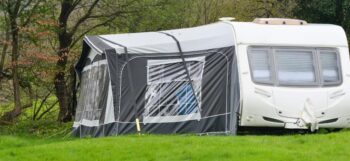When you purchase a park home, you’re making an investment in a place that will become your sanctuary for years to come. Just like any home, there are systems and structures that can wear down over time. A park home warranty can be a game-changer in protecting your investment and providing peace of mind.
In this article, we’ll explore what a park home warranty is, what it covers, why it’s important, and how to choose the right one. We’ll also offer tips on keeping your warranty valid so you can continue enjoying your home with confidence.
What is a park home warranty?
A park home warranty is a service contract that covers the costs of repairs or replacements of your park home’s essential systems and structure. Think of it as a type of insurance for the unexpected. Whether it's a leaking roof, faulty plumbing, or electrical issues, a park home warranty provides financial protection and helps ensure that repairs are handled promptly.
At its core, a park home warranty helps protect you from the high costs of fixing damage caused by normal wear and tear, ensuring that your home remains safe and comfortable without breaking the bank. The level of cover depends on the warranty type, so it’s important to check the details before relying on it.
Who provides park home warranties?
When buying or owning a park home, understanding who provides warranties is crucial. Different providers offer varying levels of protection, from covering minor repairs to safeguarding against major structural defects. Some warranties come as standard with a new park home, while others need to be purchased separately. Knowing the differences will help you choose the right cover for your needs.

Here's a breakdown of the main warranty providers:
Park home manufacturers
Many new park homes come with a manufacturer’s warranty covering structural issues and key systems. These warranties usually last between 1 and 10 years, with longer coverage for major defects.
Warranty providers & insurance companies
Independent providers such as Platinum Seal and Gold Shield offer extended protection beyond the manufacturer’s warranty. These plans cover structural repairs, heating, plumbing, electrics, and even appliances.
Park site owners or operators
Some residential parks provide limited warranties as part of their agreements. These may only apply to site services, external maintenance, or communal facilities.
Specialist home warranty companies
These companies offer home protection plans like those for traditional homes. They usually cover boilers, plumbing, heating, and electrical systems.
What does a park home warranty cover?
A park home warranty offers financial protection by covering specific parts of your home against faults, defects, and unexpected failures. However, coverage varies depending on the type of warranty you have. Some warranties focus on major structural components, while others include appliances, heating systems, and plumbing. It's important to check the details of your policy, as coverage may differ between manufacturers, third-party providers, and extended warranty plans.
Most warranties will have set terms and conditions, including maintenance requirements and claim limits. Some policies may also require repairs to be carried out by approved contractors to remain valid. Understanding these details in advance can help you avoid unexpected repair costs and ensure you get the most from your warranty.
Here’s a general breakdown of what park home warranties typically cover and exclude:
Typical coverage
- Structural warranty – Covers walls, roof, floors, and load-bearing components, such as the chassis.
- Plumbing & electrical systems – Protection against leaks, wiring faults, and pipework issues.
- Heating & boilers – Repairs or replacements for faulty heating systems.
- Built-in appliances – Some warranties include cookers, fridges, and other integrated appliances.
- Roof damage – Protection against leaks and defects in the roof structure.
What’s not covered?
- General wear and tear – Issues caused by everyday use.
- Accidental damage – Most warranties exclude accidental breakages or misuse.
- Cosmetic issues – Small cracks, scuffs, or discolouration aren’t usually covered.
- Modifications or DIY repairs – Changes made without approval can void the warranty.
Always read the terms to understand exactly what your warranty covers. Some policies may also have claim limits, exclusions, and maintenance conditions, so reviewing the small print before relying on your warranty is essential.
Types of park home warranties
Not all park home warranties are the same. The type of coverage you need will depend on factors such as the age of your home, the provider, and the level of protection you want. Some warranties come as standard with a new park home, while others can be purchased separately to provide extended cover for key systems and appliances.
If you own a new park home, you’re likely covered by a manufacturer’s warranty, which protects against defects and structural issues for a set period. However, once this expires, you may want to extend your protection with a third-party provider. Some warranties focus solely on major structural defects, while others offer a comprehensive package that includes boilers, plumbing, electrical systems, and even built-in appliances.
To help you choose the right option, here’s a breakdown of the main types of park home warranties available:
Manufacturer’s warranty
- Included with a new park home purchase.
- Covers structural and system defects for 1 to 10 years, depending on the manufacturer.
- May require registration to activate coverage.
Extended warranty
- Offered by third-party providers after the manufacturer’s warranty expires.
- Can cover boilers, plumbing, electrics, and even external maintenance.
- Typically available for an annual fee.
Structural warranty
- Long-term cover (often 10 years) for major structural defects.
- Provided by manufacturers or independent providers.
- Focuses on protecting walls, roofs, floors, and load-bearing components.
Home protection plans
- Covers appliances, heating, and essential home systems.
- Often sold as a monthly subscription.
- Ideal for older park homes that no longer qualify for manufacturer or structural warranties.
Why should I have a park home warranty?
Park homes, like any property, can develop issues over time, from structural defects to faulty appliances. Without a warranty, you could be left covering expensive repairs out of pocket, which can be a significant financial strain.
Some new park homes may also experience snagging issues—minor defects or faults that become noticeable after moving in. A warranty ensures that these early-stage issues are rectified by the manufacturer or warranty provider before they turn into costly repairs.
Many park homeowners choose to extend their warranty coverage even after their manufacturer’s guarantee expires. This helps them avoid unexpected expenses and ensures that key home systems—such as heating, plumbing, and electrics—are covered if something goes wrong.
Here are the key reasons why a park home warranty is worth considering:
Protection against unexpected costs
Major repairs can quickly become expensive. A park home warranty covers the costs associated with unforeseen breakdowns, saving you from large out-of-pocket expenses. Without a warranty, you may face thousands of pounds in repairs for something like a faulty boiler or a collapsed roof.
Financial security
By having a warranty in place, you can manage your finances more effectively. Knowing that repairs are covered offers you peace of mind and allows you to budget for other home expenses without worrying about emergency costs.
Increased home value
Having an active park home warranty can make your home more attractive to potential buyers. If you decide to sell your park home, a warranty can give buyers added assurance, knowing that the property may be protected from costly repairs for the foreseeable future.
Peace of mind
A warranty offers peace of mind, knowing that if something goes wrong, you’re not alone. You’ll have a provider ready to help and prevent a small issue from becoming a major hassle.

How do I choose the right park home warranty?
Choosing the right park home warranty is a critical decision that requires thoughtful consideration. Not all warranties are the same, and finding one that suits your needs will depend on several factors, including the age of your park home, the condition of its systems, and the level of coverage you're looking for.
Start by evaluating the most vulnerable areas of your park home. If it's a new home, you may need basic coverage, but if your home is older, a more comprehensive plan that covers plumbing, electrical systems, and structural issues might be necessary.
It’s also important to research your options carefully and ensure the warranty provider is trustworthy and provides reliable customer support. Below are some tips to help you navigate the process and make an informed choice:
Understand your park home’s needs
Consider the age of your park home, its condition, and the systems most likely to need repairs. Older homes may require more comprehensive coverage, including protection for plumbing, heating, or structural issues that might have developed over time. Newer homes may need less coverage, focusing mostly on appliances and small repairs.
Research providers
Take the time to compare different warranty providers. Look at their coverage options, reviews, and prices. You may also want to ask for recommendations from fellow park homeowners to find a reliable company.
Consider warranty length and conditions
Some warranties last for several years, while others are shorter. Consider how long you plan to stay in your park home and whether you’ll need extended protection. Review the warranty terms carefully to ensure it meets your expectations.
Review exclusions and limitations
Every warranty has exclusions and limitations. Make sure to read the fine print to know exactly what is and isn’t covered. This will help you avoid any unpleasant surprises if you need to make a claim.
Consult other park homeowners
If you’re new to park home living, ask other residents about their warranty experiences. Fellow homeowners can provide valuable insights into the reliability of different providers and help guide your decision-making process.
Things to look out for
When purchasing a park home warranty, there are a few things you should be aware of to ensure you’re getting appropriate protection:
Exclusions
Many warranties exclude certain types of damage, such as wear and tear or damages caused by neglect. Check these exclusions carefully so you know what is covered and what isn’t.
The claim process
Understanding the claims process is crucial. Find out how to file a claim, how long it takes to process, and what documentation is required. Some companies may have specific requirements for making claims, such as regular maintenance checks.
Transferability
If you decide to sell your park home, check whether the warranty can be transferred to the new owner. A transferable warranty can add value to your home and make it more appealing to buyers.
Renewal options
Look for warranties that offer easy renewal options once your initial term expires. Some providers may offer discounts for renewing, while others might increase their prices after the first term.
How do I keep a park home warranty valid?
Keeping your park home warranty valid is crucial to ensure that you’re fully covered when you need it most. Warranties often come with specific requirements and conditions, and failing to meet these can invalidate your coverage. It’s important to stay proactive and adhere to the terms outlined in your warranty agreement.
Here are some simple steps you can take to maintain the validity of your park home warranty:
Regular maintenance
Stay on top of maintenance and servicing to prevent issues from escalating. Regular checks can help spot problems early, making them easier (and cheaper) to fix.
Follow warranty terms
Make sure you adhere to the specific requirements outlined in your warranty agreement. This could include regular inspections, proper upkeep, and notifying the provider about potential problems.
Keep records
Maintain a log of all repairs and maintenance work done on your park home. Keep receipts and records, as these may be required when making a claim.
Report problems early
If you notice an issue, don’t wait to report it. Contact your warranty provider as soon as possible to avoid delays in the repair process.
Dedicated park home insurance
Due to their unique build, park homes differ in many ways from a standard property, so it’s only right that you consider having dedicated insurance to protect it. Park home insurance considers the specific risks you face with owning a park home such as the park environment, land leasing and their unique design, all of which is unlikely to be suitably covered by brick-and-mortar home insurance. That’s why tailored cover can prove important.
For over 30 years, Lifesure has provided specialist UK park home insurance for park homeowners across the country. Our policies are developed in partnership with some of the top insurers and based on customer feedback, to help cover what matters most to you.
Our specialist policy includes valuable features such as legal expenses and 24-hour home emergency as standard, at no additional cost, so you can be protected against common issues. You can also enhance your policy with options like key cover and home excess protection for extra reassurance but note that these additions will require further costs.
Our experienced and friendly agents are here to help you find the policy that fits your needs, providing guidance every step of the way. Call us on 01480 402 460 to see how we can help protect your home with a personalised park home insurance quote.
FAQs about park home warranties
What is a park home warranty?
A park home warranty is a protection plan that covers structural repairs, plumbing, electrical systems, and heating failures.
Do all new park homes come with a warranty?
Most new park homes come with a manufacturer’s warranty, but coverage varies by builder.
Can I extend my park home warranty?
Yes, many third-party providers offer extended warranties for additional protection.
What’s the difference between a warranty and insurance?
A warranty covers repairs due to faults or failures, while insurance protects against accidental damage, theft, and weather-related risks.
How do I make a warranty claim?
Check your policy’s claim process, provide evidence of the issue, and ensure you’ve followed maintenance guidelines.
Disclaimer: The sole purpose of this article is to provide guidance on the issues covered. This article is not intended to give legal advice, and, accordingly, it should not be relied upon. It should not be regarded as a comprehensive statement of the law and/or market practice in this area. We make no claims as to the completeness or accuracy of the information contained herein or in the links which were live at the date of publication. You should not act upon (or should refrain from acting upon) information in this publication without first seeking specific legal and/or specialist advice. Arthur J. Gallagher Insurance Brokers Limited trading as Lifesure accepts no liability for any inaccuracy, omission or mistake in this publication, nor will we be responsible for any loss which may be suffered as a result of any person relying on the information contained herein.
FP201-2025











